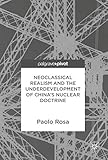Neoclassical realism and the underdevelopment of China's nuclear doctrine / Paolo Rosa
Material type: TextPublisher number: :Variety Books Publishers & Distributors | :B-10 Street No 2 West Vinod Nagar Delhi 110092 Publication details: Cham,Switzerland : Palgrave Macmillan, ©2018Description: ix, 167p. 24cmISBN: 9783319786391Subject(s): Political Science | International relations | Realism -- Political aspects | Nuclear weapons -- Government policy -- China | Nuclear arms control | China -- Military policy | Military policy | Nuclear weapons --Genre/Form: DDC classification: 327.101 ROS
TextPublisher number: :Variety Books Publishers & Distributors | :B-10 Street No 2 West Vinod Nagar Delhi 110092 Publication details: Cham,Switzerland : Palgrave Macmillan, ©2018Description: ix, 167p. 24cmISBN: 9783319786391Subject(s): Political Science | International relations | Realism -- Political aspects | Nuclear weapons -- Government policy -- China | Nuclear arms control | China -- Military policy | Military policy | Nuclear weapons --Genre/Form: DDC classification: 327.101 ROS | Item type | Current library | Call number | Status | Date due | Barcode | Item holds |
|---|---|---|---|---|---|---|
 Books
Books
|
SNU LIBRARY | 327.101 ROS (Browse shelf(Opens below)) | Not For Loan | 26482 |
Browsing SNU LIBRARY shelves Close shelf browser (Hides shelf browser)

|

|

|

|

|

|

|
||
| 327.101 RIP Neoclassical realist theory of international politics | 327.101 ROS Thinking theory thoroughly | 327.101 ROS The Empire of Civil Society | 327.101 ROS Neoclassical realism and the underdevelopment of China's nuclear doctrine | 327.101 ROS The empire of civil society : a critique of the realist theory of international relations. | 327.101 SCH Deadly imbalances | 327.101 SET Postcolonial theory and international relations |
Intro; Acknowledgements; Contents; List of Tables; Chapter 1 Introduction: Competing Explanations for the Underdevelopment of China's Nuclear Doctrine; Abstract; 1.1 The Underdevelopment of China's Nuclear Doctrine; 1.2 "Existential Deterrence" and Minimum Means of Reprisal; 1.3 Traditional Strategic Culture and the Art of Ambiguity; 1.4 Maoist Military Thought and the Downplaying of Military Technology; 1.5 Organization of the Book; References; Chapter 2 A Neoclassical Realist Approach to Military Doctrines; Abstract; 2.1 Military Doctrine and Nuclear Doctrine 2.2 International Source of Military Doctrine: The "Balance of Power" Model2.3 Domestic Sources of Military Doctrine (1): The Organizational Model; 2.4 Domestic Sources of Military Doctrine (2): Strategic Cultures; 2.5 A Neoclassical Realist Framework of China's Nuclear Doctrine Formation; References; Chapter 3 China's Nuclear Programme: Origins and Progress; Abstract; 3.1 Mao and the Bomb; 3.2 The Development of the Programme; 3.3 The Doctrine of "No-First-Use"; References; Chapter 4 Nuclear Doctrine as a Continuation of Factional Politics by Other Means, 1964-1971; Abstract 4.1 The International Situation: The Indochina War, the Soviet Threat and the 1969 Military Clashes4.2 The Domestic Environment: "Politics in Command"; 4.3 The Strategic Debate During the Cultural Revolution: Factions and Foreign Policy Attitudes; 4.4 The Impact on Nuclear Doctrine: The Lack of Operational Concepts; References; Chapter 5 Elite Stability and Nuclear Doctrine Formulation, 1978-1989; Abstract; 5.1 The International Situation: The Vietnam "Lesson", The Soviet Invasion of Afghanistan, and the SDI; 5.2 The Domestic Environment: Deng, Elite Stability and Military Modernization 5.3 The Strategic Debate: People's War Under Modern Conditions5.4 The Impact on Nuclear Doctrine: Considering Limited Nuclear War-Fighting Options; References; Chapter 6 Conclusions; Abstract; References; References; Index
This book addresses the under-researched discourse of the evolution of Chinese nuclear posture, and in particular, explains the absence from this evolution of a coherent and well-defined operational doctrine


There are no comments on this title.